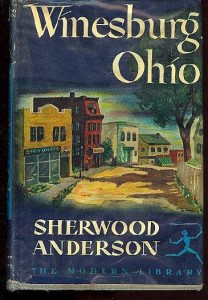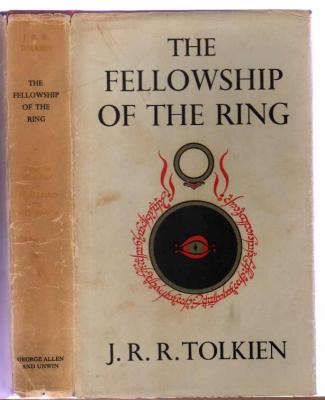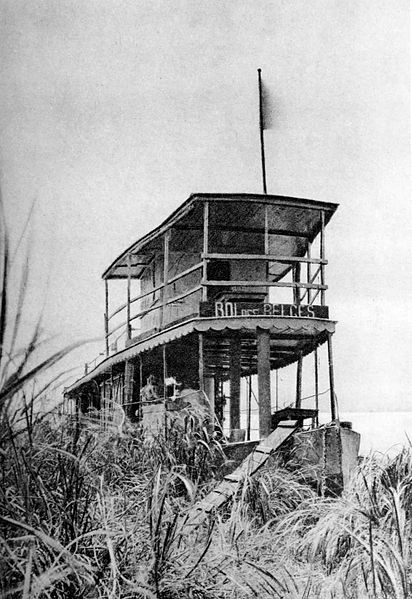Winesburg, Ohio
 Sherwood Anderson’s Winesburg, Ohio is a book of short stories that created a stir when it was first published in 1919. My library copy included an introduction by Malcolm Cowley which suggested Anderson’s great strength as a writer was to provide momentary, bright glimpses of character and truth, and this is why 1) this book succeeded, and 2) Anderson never succeeded as a novelist. My Benet’s Reader’s Encyclopedia mentions its “lyric beauty.” Another source spoke of its logic as song-like. But unlike these critics who seem unanimous on its literary merits, other readers objected to it as “pessimistic or destructive or morbidly sexual” (quoted from Malcolm Cowley’s introduction).
Sherwood Anderson’s Winesburg, Ohio is a book of short stories that created a stir when it was first published in 1919. My library copy included an introduction by Malcolm Cowley which suggested Anderson’s great strength as a writer was to provide momentary, bright glimpses of character and truth, and this is why 1) this book succeeded, and 2) Anderson never succeeded as a novelist. My Benet’s Reader’s Encyclopedia mentions its “lyric beauty.” Another source spoke of its logic as song-like. But unlike these critics who seem unanimous on its literary merits, other readers objected to it as “pessimistic or destructive or morbidly sexual” (quoted from Malcolm Cowley’s introduction).
My own reaction to the book is somewhere between these two extremes. I recognize the beauty of its writing. It’s written simply and straightforwardly, capturing characters’ essence over and over with stunning economy. Its narrator functions as a keenly observant eye, never staining the lens with strong personality, moralizing, or emotional heavy-handedness.
Except in the first story, “The Book of the Grotesque.” Here Anderson essentially orients the reader to his purpose by setting forth the book’s organizing myth:
In the beginning when the world was young there were a great many thoughts but no such thing as a truth. Man made the truths himself and each truth was a composite of a great many vague thoughts. All about in the world were the truths and they were all beautiful… And then the people came along. Each as he appeared snatched up one of the truths and some who were quite strong snatched up a dozen of them. It was the truths that made the people grotesques… The moment one of the people took one of the truths to himself, called it his truth, and tried to live his life by it, he became a grotesque and the truth he embraced became a falsehood.
The only character in this collection of stories, many of them only 5 or 6 pages long, who isn’t a “grotesque” in the sense described here is George Willard, a young reporter who becomes the audience — or perhaps more accurately, the hearer of confessions — for other characters. Over and over, those who are struggling to make sense of life, or who have chosen their course and lived to a disfigured old age, buttonhole him and explain their experience. Usually these encounters take place at night and outdoors, which may have helped to give this collection a timeless quality that transcends its very specific locale of smalltown Winesburg in an innocent era.
Willard himself is a quintessential young man of “a great many vague thoughts,” a passive recipient of information. He appears in almost all of the tales, sometimes as a main character, sometimes as a peripheral character in someone else’s story on whom others project some significance. Eventually, he leaves Winesburg to seek his fortune. If I were to read the criticism of this book, I’m sure it wouldn’t take long before I heard an argument for Willard as Anderson’s writerly persona, a portrait of the artist as a young man. He becomes, in the sense described above, a “composite” of the truths others confess to him but doesn’t really develop or change in any significant way himself. He succeeds in not becoming a grotesque, but it remains to be seen whether he’ll develop into anything else.
For some reason, despite its strengths, I struggled through this book. Very possibly, this isn’t so much the fault of the book as the beautiful weather that’s freed me from my house and taken me outdoors. I’d bring the book with me, but let’s just say my reading process was interrupted more frequently than usual.
A second reason is that if someone had taken Thoreau’s statement that most men lead lives of quiet desperation, and plotted out a fictional argument for it, this would be the resulting book. I don’t despise such truth as it conveys. I’m grateful for a glimpse into other ways of thinking and experiencing. Why else do we read but for that? I’m just saying it began to weigh me down, taken all in a gulp. Quality? No question. Significance as a literary achievement? No question. Pleasure in reading it? Well, there’s a question there. Surely I delighted in some of the book’s beauty, but I also wasn’t sorry to see it end.


